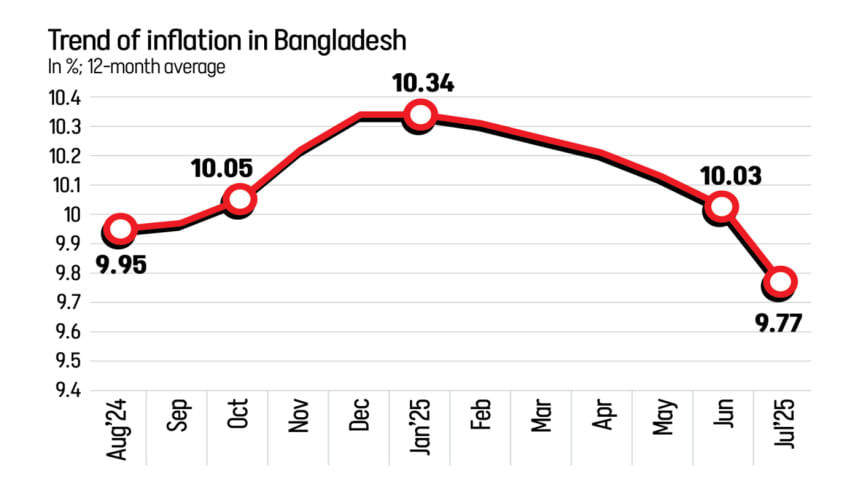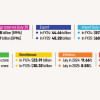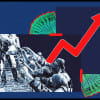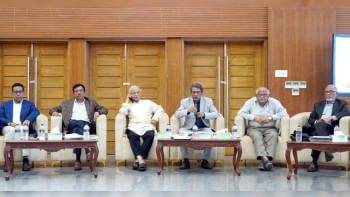No real relief for the poor

Over the past year, the overall economy has shown signs of recovery. Yet the queues before trucks selling subsidised food have not shortened.
In the shadow of macroeconomic improvement, hunger still bites as hard as ever.
From dawn, long before sales start at 9 am, people line up in punishing heat or pouring rain. They jostle, argue and fight for basic items such as rice, lentils and cooking oil at slightly lower prices than in the markets. Many leave empty-handed when supplies run out.
The World Bank estimates that the number of the extreme poor was 95 lakh in 2022 and will reach 1.5 crore this year. For those living on $2.15 or less a day, more than 9 percent inflation for more than two years has meant hunger, and in some cases, starvation.
Others have tried to cope with soaring food and non-food prices by cutting nutrition, skipping medical care and taking children out of school. In Dhaka and across other districts, such stories are far from rare.
Take Masud Rana, a rickshaw puller from Bheramara upazila of Kushtia. He has been working in the capital for 20 years to support his wife, three children and mother.

On Tuesday, the 33-year-old said his income has not kept pace with expenses over the past year, forcing cuts to daily needs.
He earns around Tk 12,000 a month. "Even years ago, I used to eat fish five days a week -- Tilapia, Silver Carp, and small fish. But now I can only afford it twice a week."
Most days, the family eat simple vegetables like gourds and potatoes.
At the start of the school year, Rana said he could not buy new clothes for his children. When his wife asked for a dress a month ago, he had to refuse. "I feel physically weak due to poor nutrition and lack of rest, but I have not seen a doctor because I cannot afford it."
For Samiul Islam, a private sector employee in Dhaka, the squeeze is different but just as real.
Representing many in the middle-income bracket, Islam said that despite cutting all non-essential spending, he has to borrow at the end of each month.
"Earlier, we used to dine out at least once a month. We had to leave that luxury. Recently, we planned a short trip outside Dhaka. But once we calculated the costs, we realised it was not possible."
In Sirajganj's Garudaha village, powerloom worker Omar Faruk earns around Tk 8,000 a month. Without land, he supports his wife and young child entirely on his factory wages.
"Most of my earnings go to rice and daily essentials. Prices for some basics are a bit better than last year, but I still cannot save for my daughter or help my parents," said Faruk.
At Mirpur-11 area of the capital, garment employee Darul Huda earns Tk 30,000-35,000 a month.
His family of three lives in a small rented flat. "I own no property here or in my village. Prices rise every year, and there is no respite," he said.
HIGH PRICES, RISING POVERTY
In July, overall inflation stood at 8.55 percent, up from 8.48 percent the previous month, according to the Bangladesh Bureau of Statistics (BBS).
Food inflation rose to 7.56 percent from 7.39 percent, reversing a seven-month decline since November last year, when it was 13.8 percent.
Wages have failed to keep up. Real wage growth has been negative for 42 consecutive months. In June, wage growth was 8.19 percent against the 8.55 percent inflation.
In a report, the World Bank projected that national poverty of Bangladesh will rise to 22.9 percent in 2025, from 18.7 percent in 2022. Extreme poverty, living on less than $2.15 a day, is expected to almost double to 9.3 percent, pushing 30 lakh more people into destitution.
Globally, Bangladesh ranks fourth for the highest number of people facing severe food insecurity, according to the Global Report on Food Crises 2025.
It cites climate shocks, high import costs and weak social safety nets as key drivers.
"The challenge of food security in Bangladesh has been there for quite a long time," said Selim Raihan, an economics professor at the University of Dhaka. "If you look at the indices over the past decade, including hunger indices, Bangladesh has not performed well."
He said market availability of food alone does not ensure security. "People need jobs and rising real incomes."
"From these angles, there is no doubt that food security has deteriorated. Over the past two to three years, surveys and estimates from international organisations all show the same. Food security for the poorest has worsened," said Raihan, also the executive director of the South Asian Network on Economic Modeling (Sanem).
During the fiscal year 2024-25, the government distributed around 32.5 lakh tonnes of subsidised grains, which was almost the same the previous year. The government targets to distribute 36.61 lakh tonnes in FY26, which is higher than the total distribution in the previous year.
In July this year, food distribution dropped to 1.15 lakh tonnes from 1.65 lakh tonnes a year earlier. The open market sale (OMS) of rice fell sharply, with beneficiaries reduced from 1 crore to 55 lakh after reports of irregularities.
Raihan said inflation has eased, it remains uncomfortably high.
"Even if headline inflation has cooled off a bit, food prices stay high."
He pointed out that India's inflation is below 5 percent, Sri Lanka's is negative, and Pakistan's and Nepal's are lower.
"Despite global food prices, including rice, falling significantly, this has not shown in our domestic market. While headline inflation has eased, prices of rice and other essentials have not cooled, keeping food security under threat with no major improvement over the past year," added the Sanem executive director.


 For all latest news, follow The Daily Star's Google News channel.
For all latest news, follow The Daily Star's Google News channel. 





Comments